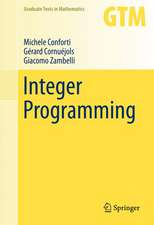Anticipatory Optimization for Dynamic Decision Making: Operations Research/Computer Science Interfaces Series, cartea 51
Autor Stephan Meiselen Limba Engleză Paperback – aug 2013
However, actually solving a dynamic decision problem by means of approximate dynamic programming still is a major scientific challenge. Most of the work done so far is devoted to problems allowing for formulation of the underlying optimization problems as linear programs. Problem domains like scheduling and routing, where linear programming typically does not produce a significant benefit for problem solving, have not been considered so far. Therefore, the industry demand for dynamic scheduling and routing is still predominantly satisfied by purely heuristic approaches to anticipatory decision making. Although this may work well for certain dynamic decision problems, these approaches lack transferability of findings to other, related problems.
This book has serves two major purposes:
‐ It provides a comprehensive and unique view of anticipatory optimization for dynamic decision making. Itfully integrates Markov decision processes, dynamic programming, data mining and optimization and introduces a new perspective on approximate dynamic programming. Moreover, the book identifies different degrees of anticipation, enabling an assessment of specific approaches to dynamic decision making.
‐ It shows for the first time how to successfully solve a dynamic vehicle routing problem by approximate dynamic programming. It elaborates on every building block required for this kind of approach to dynamic vehicle routing. Thereby the book has a pioneering character and is intended to provide a footing for the dynamic vehicle routing community.
| Toate formatele și edițiile | Preț | Express |
|---|---|---|
| Paperback (1) | 552.45 lei 38-44 zile | |
| Springer – aug 2013 | 552.45 lei 38-44 zile | |
| Hardback (1) | 641.71 lei 6-8 săpt. | |
| Springer – 29 iun 2011 | 641.71 lei 6-8 săpt. |
Din seria Operations Research/Computer Science Interfaces Series
- 24%
 Preț: 921.99 lei
Preț: 921.99 lei - 18%
 Preț: 944.19 lei
Preț: 944.19 lei - 18%
 Preț: 1227.21 lei
Preț: 1227.21 lei - 18%
 Preț: 947.67 lei
Preț: 947.67 lei - 18%
 Preț: 1224.54 lei
Preț: 1224.54 lei - 20%
 Preț: 1792.96 lei
Preț: 1792.96 lei - 18%
 Preț: 944.82 lei
Preț: 944.82 lei - 20%
 Preț: 1289.93 lei
Preț: 1289.93 lei - 18%
 Preț: 961.23 lei
Preț: 961.23 lei - 18%
 Preț: 951.59 lei
Preț: 951.59 lei - 20%
 Preț: 1047.88 lei
Preț: 1047.88 lei - 20%
 Preț: 642.65 lei
Preț: 642.65 lei - 18%
 Preț: 944.82 lei
Preț: 944.82 lei - 20%
 Preț: 996.07 lei
Preț: 996.07 lei - 20%
 Preț: 989.13 lei
Preț: 989.13 lei -
 Preț: 379.09 lei
Preț: 379.09 lei - 18%
 Preț: 954.62 lei
Preț: 954.62 lei - 18%
 Preț: 945.30 lei
Preț: 945.30 lei - 24%
 Preț: 908.33 lei
Preț: 908.33 lei - 18%
 Preț: 957.32 lei
Preț: 957.32 lei - 20%
 Preț: 996.88 lei
Preț: 996.88 lei - 15%
 Preț: 646.75 lei
Preț: 646.75 lei - 20%
 Preț: 1283.49 lei
Preț: 1283.49 lei - 18%
 Preț: 949.55 lei
Preț: 949.55 lei - 15%
 Preț: 658.88 lei
Preț: 658.88 lei - 18%
 Preț: 895.58 lei
Preț: 895.58 lei
Preț: 552.45 lei
Preț vechi: 690.55 lei
-20% Nou
Puncte Express: 829
Preț estimativ în valută:
105.73€ • 109.97$ • 87.28£
105.73€ • 109.97$ • 87.28£
Carte tipărită la comandă
Livrare economică 08-14 aprilie
Preluare comenzi: 021 569.72.76
Specificații
ISBN-13: 9781461429166
ISBN-10: 1461429161
Pagini: 196
Ilustrații: XIV, 182 p.
Dimensiuni: 155 x 235 x 10 mm
Greutate: 0.29 kg
Ediția:2011
Editura: Springer
Colecția Springer
Seria Operations Research/Computer Science Interfaces Series
Locul publicării:New York, NY, United States
ISBN-10: 1461429161
Pagini: 196
Ilustrații: XIV, 182 p.
Dimensiuni: 155 x 235 x 10 mm
Greutate: 0.29 kg
Ediția:2011
Editura: Springer
Colecția Springer
Seria Operations Research/Computer Science Interfaces Series
Locul publicării:New York, NY, United States
Public țintă
Professional/practitionerCuprins
Introduction.- Basic Concepts and Definitions.- Perfect Anticipation.- Synergies of Optimization and Data Mining.- Approximate Anticipation.- Dynamic Vehicle Routing.- Anticipatory Routing of a Service Vehicle.- Computational Study.- Managerial Impact of Anticipatory Optimization.- Conclusions.
Textul de pe ultima copertă
The availability of today’s online information systems rapidly increases the relevance of dynamic decision making within a large number of operational contexts. Whenever a sequence of interdependent decisions occurs, making a single decision raises the need for anticipation of its future impact on the entire decision process. Anticipatory support is needed for a broad variety of dynamic and stochastic decision problems from different operational contexts such as finance, energy management, manufacturing and transportation. Example problems include asset allocation, feed-in of electricity produced by wind power as well as scheduling and routing. All these problems entail a sequence of decisions contributing to an overall goal and taking place in the course of a certain period of time. Each of the decisions is derived by solution of an optimization problem. As a consequence a stochastic and dynamic decision problem resolves into a series of optimization problems to be formulated and solved by anticipation of the remaining decision process.
However, actually solving a dynamic decision problem by means of approximate dynamic programming still is a major scientific challenge. Most of the work done so far is devoted to problems allowing for formulation of the underlying optimization problems as linear programs. Problem domains like scheduling and routing, where linear programming typically does not produce a significant benefit for problem solving, have not been considered so far. Therefore, the industry demand for dynamic scheduling and routing is still predominantly satisfied by purely heuristic approaches to anticipatory decision making. Although this may work well for certain dynamic decision problems, these approaches lack transferability of findings to other, related problems.
This book has serves two major purposes:
‐ It provides a comprehensive and unique view of anticipatory optimization for dynamic decision making. Itfully integrates Markov decision processes, dynamic programming, data mining and optimization and introduces a new perspective on approximate dynamic programming. Moreover, the book identifies different degrees of anticipation, enabling an assessment of specific approaches to dynamic decision making.
‐ It shows for the first time how to successfully solve a dynamic vehicle routing problem by approximate dynamic programming. It elaborates on every building block required for this kind of approach to dynamic vehicle routing. Thereby the book has a pioneering character and is intended to provide a footing for the dynamic vehicle routing community.
However, actually solving a dynamic decision problem by means of approximate dynamic programming still is a major scientific challenge. Most of the work done so far is devoted to problems allowing for formulation of the underlying optimization problems as linear programs. Problem domains like scheduling and routing, where linear programming typically does not produce a significant benefit for problem solving, have not been considered so far. Therefore, the industry demand for dynamic scheduling and routing is still predominantly satisfied by purely heuristic approaches to anticipatory decision making. Although this may work well for certain dynamic decision problems, these approaches lack transferability of findings to other, related problems.
This book has serves two major purposes:
‐ It provides a comprehensive and unique view of anticipatory optimization for dynamic decision making. Itfully integrates Markov decision processes, dynamic programming, data mining and optimization and introduces a new perspective on approximate dynamic programming. Moreover, the book identifies different degrees of anticipation, enabling an assessment of specific approaches to dynamic decision making.
‐ It shows for the first time how to successfully solve a dynamic vehicle routing problem by approximate dynamic programming. It elaborates on every building block required for this kind of approach to dynamic vehicle routing. Thereby the book has a pioneering character and is intended to provide a footing for the dynamic vehicle routing community.
Caracteristici
First book to show how to solve dynamic vehicle routing problems with approximate dynamic programming with anticipation Introduces anticipatory optimization for dynamic decision making Explores synergies of optimization and data mining and the potential in anticipation











